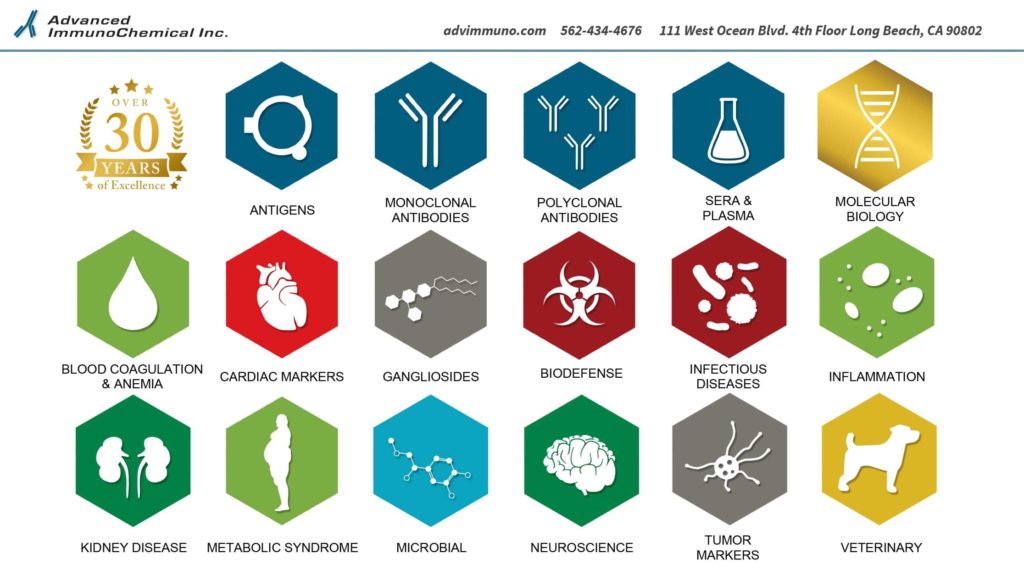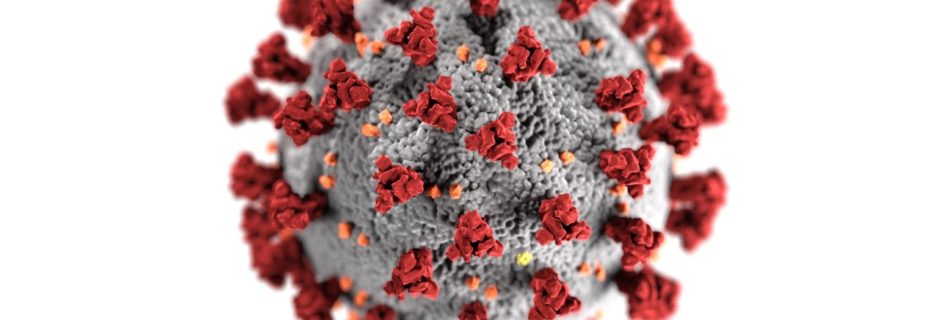New. Biomarkers to screen for mysterious heart damage and other health issues befalling some COVID-19 patients.
Testing for SARS-CoV-2 is not the only requirement in regards to managing COVID-19. Screening and monitoring for the various health issues that may arise as part of COVID-19 disease management are also needed. You can find the following biomarkers in our Advanced ImmunoChemical product catalog:
Cardiac troponins
Cardiac troponin I is currently considered as the gold standard biomarker test for myocardial infarction. Moreover, cTnI measurements by new generation of high-sensitivity cTnI assays could be helpful for long-term risk stratification of different patient groups including patients with heart failure or acute coronary syndrome.
See products:
Chimeric cardiac troponin I antibodies Assay Notes
hsCRP
Human C-reactive protein (CRP) is one of the so called acute phase proteins. Its concentration in blood increases rapidly as a response to inflammation. CRP is a 224 residue protein with a monomer molecular mass of approximately 25 kDa and pI 6.4 (1-4). It belongs to pentraxins, an evolutionally conserved family of proteins characterized by calcium dependent ligand binding and radial symmetry of five monomers forming a ring around central pore (5). The precise function of CRP in vivo is still not yet completely clear. CRP has been shown to participate in inflammatory as well as innate immunity processes. Important bioactivities of CRP are determined by its ability to bind to a variety of ligands, such as damaged cell membranes, apoptotic cells and fibronectin, with the highest affinity to phosphocholine residues. When CRP is ligand-bound, it can be recognized by the complement component C1q, which leads to activation of the classical complement pathway. On the other hand, via interaction with the complement factor H, CRP regulates the alternative complement pathway (6).
CRP in diagnostics
C-reactive protein is accepted in clinical use as a major, although rather non-specific, marker of inflammation. In generally healthy people, CRP levels are usually less than 5 mg/L. In pathology, CRP concentration has an enormous, 10,000-fold dynamic range (approximately 0.05–500 mg/L) (7). The highest levels of CRP (above 30 mg/L) are observed in bacterial infection, such as septic arthritis, meningitis and pneumonia.
In 2003, the Centers for Disease Control and Prevention (CDC) and the American Heart Association (AHA) issued a statement that identified CRP as the inflammatory marker best suited for use in current clinical practice to assess cardiovascular risk (8). Many epidemiologic studies have indicated that CRP is a strong independent predictor of future cardiovascular events, including myocardial infarction, ischemic stroke, peripheral vascular disease, and sudden cardiac death without known cardiovascular disease (as reviewed by Clearfield (9)). The CDC/ AHA guidelines support the use of CRP in primary prevention and set cutoff points according to relative risk categories: low risk (<1.0 mg/L), average risk (1.0-3.0 mg/L), and high risk (>3.0 mg/L). This is why present day high sensitivity CRP (hsCRP) assays are aimed at nanogram per milliliter (ng/ml) CRP level distinction.
Reagents for hsCRP assay development
Our monoclonal antibodies have been used in novel immunometric assays that achieve excellent sensitivity with linear detection range from 0.025 mg/L to 2.5 mg/L in a magnetic biosensor assay (10) and from 0.01 mg/L to 50 mg/L in an immunochemiluminometric assay (11). In both assays, the detection limit was 0.004 mg/L. A detection limit of 0.0011 mg/L was reached in a solid-phase sandwich fluorescence immunoassay using nanocrystals (12). Our best pairs C2-C6 and C5-CRP135 and several others provide 10,000-fold linearity in experimental immunofluorometric assays. Our antibodies could be used for the development of hsCRP assays for different diagnostic platforms. In addition to monoclonal antibodies, we also provide purified native CRP and CRP-free serum.
See products:
High Sensitivity Human C-Reactive Protein (hsCRP) Assay Notes
Cystatin C
Cystatin C is a low molecular weight (13.4 kDa) protein that functions as an inhibitor of various cysteine proteases in the bloodstream. It inhibits both endogenous proteases, such as lysosomal cathepsins, and proteases of parasites and microorganisms. Cystatin C binds to the target molecule in μM to the sub pM range in a competitive reversible manner (1). Due to its important function, cystatin C is expressed at the stable levels by most of the nucleated cells. Cystatin C consists of 120 amino acid residues encoded by a 7.3 kb gene located in chromosome 20 (2). The Leu68Gln mutation in the cystatin C protein sequence is directly linked to the development of hereditary cystatin C amyloid angiopathy (HCCAA) in which the patients suffer from repeated cerebral hemorrhages (3).
Cystatin C is known in clinical practice as a well-described serum marker of renal failure that is not dependent on age, sex or lean muscle mass (4, 5). At the same time, cystatin C is becoming acknowledged as a marker of elevated risk of death from cardiovascular complications – myocardial infarction and stroke (5). A stable production rate and free filtration by the renal glomeruli due to the low molecular weight, and positive charge (pI 9.3) are strong advantages of cystatin C as a serum marker of renal function in comparison to other analytes that are used today in clinical practice. Creatinine-based equations to estimate the glomerular filtration rate (GFR) are sensitive to some non-renal factors, such as age, sex, race and lean muscle mass. There is a growing number of reports demonstrating that cystatin C is more preferable than creatinine for the measurement of GFR, so long as it does not depend on all of these factors (5).
Cystatin C is also a more sensitive marker of mild renal dysfunction than creatinine (6). The concentrations of plasma (serum) cystatin C in healthy individuals range from 0.8 to 1.2 mg/l, depending on measurement methods (7). Increased cystatin C serum levels are almost exclusively associated with a reduction in GFR. Serum concentrations of cystatin C are increased approximately 2-fold during various renal disorders (7). An elevated serum cystatin C level is also a strong predictor of the risk of death and cardiovascular events in elderly persons (5).
The urinary concentrations of cystatin C are low (100 μg/l for healthy subjects) since the protein is metabolized by the proximal tubule after filtration in the renal glomerulus. However, the concentrations of cystatin C in urine from patients with renal tubular disorders are raised by approximately 200-fold (8). Cystatin C that is purified from human urine can be partially truncated, which potentially complicates the application of the urine protein as a standard for immunoassays (9).
Advanced ImmunoChemical offers everything you need for the development of the cystatin C immunoassay – human recombinant cystatin C, native human cystatin C purified from human blood, anti-cystatin C polyclonal antibodies, as well as a set of high-affinity monoclonal antibodies that are specific to different epitopes of human cystatin C molecule. We also supply our customers with information regarding the best MAb combinations to be used in sandwich immunoassays for quantitative measurements of cystatin C in body fluids.
See products:
D-dimer
Elevated levels of D-dimer are found in the blood of patients with pulmonary embolism, deep vein thrombosis and atherosclerosis. D-dimer diagnostic tests are widely used to exclude the diagnosis of deep vein thrombosis. In addition, increased amount of D-dimer in blood is believed to be a reliable marker of pathological coagulation that underlies the pathogenesis of most cardiovascular diseases.
See products:
D-Dimer and High Molecular Weight Fibrin Degradation Products Assay Notes
Blood Coagulation and Anemia Products
Myoglobin
Myoglobin is a small heme-containing protein (153 a.a.r., MW (w/o heme) 17,053 Da and theoretical pI=7.29), that is responsible for the oxygen deposition in muscle tissues. Only one form of myoglobin is expressed in cardiac and skeletal muscles. Myoglobin has been used as a marker of myocardial damage for almost six decades (1). It is commonly used in clinical practice as an early marker of AMI (2). However, due to the high concentration of myoglobin in skeletal muscle tissues, even minor skeletal muscle injury increases the myoglobin levels in blood (3). Therefore, myoglobin alone is not considered to be a reliable and sufficient marker in AMI diagnosis. Instead, it should be used together with cTnI or cTnT analysis as part of a multimarker strategy for improved specificity in AMI diagnosis.
See products:
Human proBNP, BNP and NT-proBNP
Brain natriuretic peptide (BNP) and the N-terminal part of the BNP precursor proBNP (NT-proBNP) are established diagnostic and prognostic biomarkers of heart failure (HF). HF is a severe clinical and public health problem that is characterized by an increasing prevalence and economic cost. According to the American Heart Association, its prevalence extends to 6.5 million people in the United States with nearly 1 million new cases being reported each year (1); on a global level, the prevalence reaches more than 23 million people. Chronic heart disease, hypertension and diabetes are among the known risk factors and the prevalence of HF is also higher for those people aged over 65 years. HF is associated with significant morbidity and mortality.
See products:
Human proBNP, BNP and NT-proBNP AssayNotes
Procalcitonin and Calcitonin Products
Procalcitonin (PCT) is a small protein that is synthesized by the C-cells in thyroid glands.PCT is considered to be the main marker of disorders that are accompanied by systemic inflammation and sepsis.
See products:
Procalcitonin (PCT) Assay Notes
Human serum amyloid A (SAA)
Serum amyloid A apolipoprotein family consists of three members that in human beings are coded by different genes: SAA1, SAA2, and SAA4 (reviewed in 1-3). SAA1 and SAA2 are so-called acute phase isoforms. ThePir expression is increased in response to inflammation. SAA4 is a constitutive isoform, the expression of which does not change during an acute-phase response. In addition, one more related gene (SAA3) has been identified, although this gene is not expressed in human beings.
See products:
Human serum amyloid A (SAA) Assay Notes
References:
6. Chinese Clinical Guideline for COVID-19 Pneumonia Diagnosis and Treatment (7th edition)
Other news:
Advanced ImmunoChemical is open and operations continue as normal
We would like to confirm that we are continuing to supply our products as normal and do not foresee any significant disruption to our product availability or shipping schedules. However, circumstances can change rapidly. Therefore, we will continue to monitor developments and do our best to let you know as soon as possible if the situation regarding our product supply changes.
Browse our products and order online: www.advimmuno.com/shop or at order@advimmuno.com.



